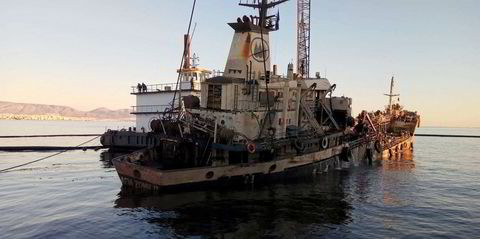Banks holding $400bn worth of shipping debt have been warned to “future-proof investments” ahead of the onset of decarbonisation policies by the middle of the next decade.
Research by the Carbon War Room says significant investments will be needed to ensure vessels are competitive when new climate policies are introduced as soon as 2023.
James Mitchell, senior associate for shipping at the Carbon War Room, tells TradeWinds the report has been published after an 18-month study into climate risk facing the industry.
“The relevance of this work is to show for the first time that the financial impacts of carbon pricing are material,” he said.
“We see they will need to be managed and we would also say they can be managed but it makes sense to start as early as possible.
“What we are setting out to do is make sure the first step of decarbonisation, the implementation of that first carbon price or market based mechanism, whatever that turns out to be, is a successful one.”
While a statement released today specifically targets shipping lenders, Mitchell says the report is not out to name and shame any particular stakeholder.
“The research has findings relevant to banks, shipowners and shareholders,” he said.
Mitchell highlights both the need for flexibility in vessel design, so they can be adapted to a world with a high carbon price, and a need for significant capital to fund upgrades.
He acknowledges the report, from which some of the findings were presented at Danish Maritime Days last year, comes at a time when many shipowners are battling to keep their companies afloat.
“My response today is I get that. These issues are huge and you are fighting for survival. However, this is a classic case of the iceberg is coming, it’s not that hard to avoid with a small trim of the rudder this far out. And frankly our recommendations to shipowners, to financiers, to shareholders are quite pragmatic and they are not that hard to implement.”
Mitchell says the organisation’s modeling, which charts for the onset of carbon pricing in 2025, is “realistic and conservative”
“What we are trying to say is if you are a financier and you are making a finance decision today, a vessel may well be delivered in 2020,” he said.
“So, before that vessel’s first dry-dock it’s probably going to have to compete under some sort of carbon price. Therefore, decisions made today need to be considered within this framework of what is coming down the pipe.”
Mitchell bats away suggestions that first-movers on environmental legislation often end up losing out financially. He points to a project between Hammonia Reederei and Intermarine where the charterer supports environmental technology the owner could otherwise not afford.
“This is a good example of something that can be done before the implementation of a carbon price to basically give the first mover the advantage and flip that dynamic around,” Mitchell said.
“We are not here to say there are risks coming. We are here to say decarbonisation, at least the first part of it, is going to create some opportunities. Those who can innovate are going to be the ones who are most successful in this first step.”




